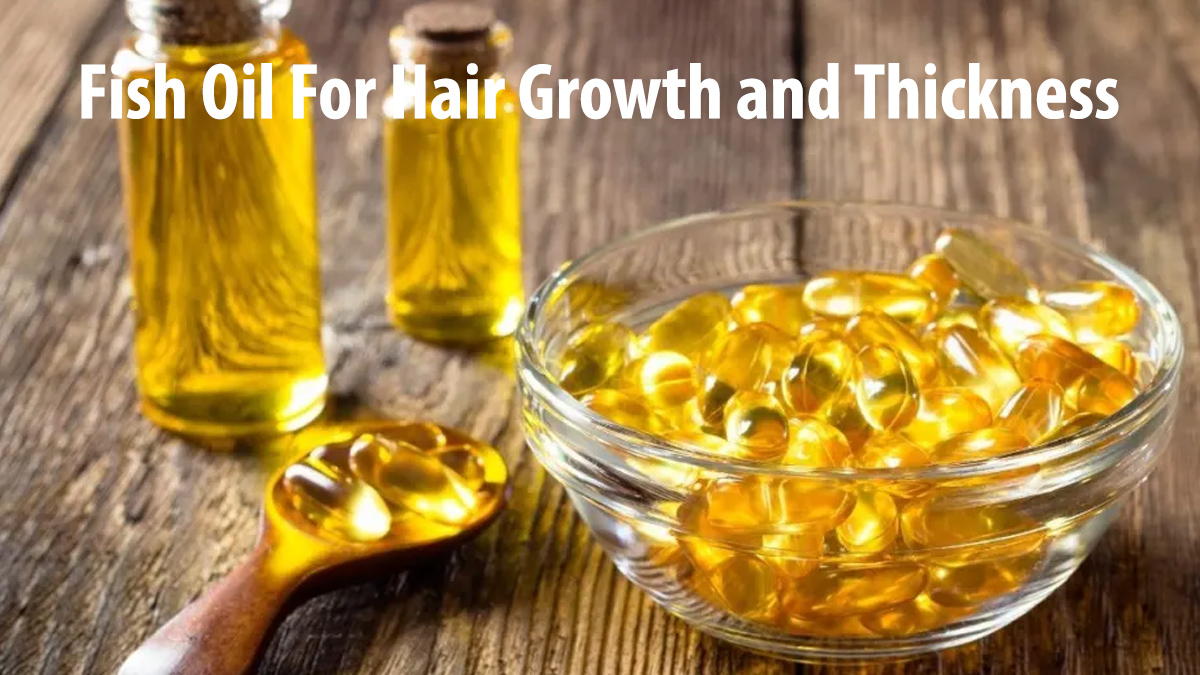Have you heard of fish oil and wondered if it can help with your hair growth and thickness? This article explains what fish oil is and whether or not it can help. Find out about the sources of fish oil and how much you should take to experience the benefits. Then, learn what you can do to get the most out of fish oil for hair growth and thickness. Besides eating fish, you can also use capsules or supplements to get the same benefits.
What is fish oil?
If you’re interested in increasing your hair’s thickness and growth, you’ll be happy to know that it can be used topically or taken orally. Fish oil is an excellent source of omega-3 fatty acids and protein, two elements that are crucial for the health and appearance of hair. Fish oil is easily incorporated into the diet and can be found in many different products, including hair oils and shampoos. You can also add a few capsules to your daily regimen.
The anti-inflammatory properties of fish oil are beneficial for the body and can help prevent inflammation, which is connected to many common health problems. It also regulates sebum production, making it safe for both dry and oily skin types. The anti-inflammatory properties of fish oil can even help to maintain the health of the gut, preventing gastrointestinal problems. So, if you’re wondering what’s fish oil for hair growth and thickness?
Fish oil is derived from the tissue of fatty fish. It has numerous cosmetic and therapeutic uses. There are different ways to extract this oil, including solvents, wet pressing, and utilizing enzymes in fish silage. The most common method of extraction involves wet pressing. During this process, the oil is pressed and subsequently decanted. Centrifugation is also part of the process.
Is it good for hair loss?
If you are looking for a way to grow hair longer and thicker, fish oil can help. It is an excellent source of omega-3 fatty acids, and is an excellent way to improve the overall health of your hair. A healthy person will shed between 50 to 100 hairs a day. It is part of the growth cycle, and it helps to strengthen your hair from the roots. You can add it to your diet by eating fish like mackerel, salmon, and sardines. You can also take it in the form of supplements or capsules.
Choosing a product with fish oil isn’t difficult, and you may already be using one. Some hair products now contain Omega-3, including Carol’s Daughter Tui Hair Smoothee and Ouidad Omega-3 Replenishing Hair Treatment. Obviously, the best way to get Omega-3 in your diet is to eat fish. There are two easy recipes that incorporate fish oil in your diet. And, while eating fish is the most obvious way to get enough of the fatty acid, there are also many other ways to consume it.
Besides promoting hair health, fish oil can also help with dandruff and itchy scalp. It also improves the overall hair cycle. By boosting blood flow, it can help your hair follicles and promote a healthy scalp. The increased blood flow can help you achieve optimal hair growth period and speed. Therefore, it is worth taking fish oil. The best part is, fish oil is a natural remedy for many different problems, and it has been around for centuries.
Is fish oil good for thinning hair?
It’s a known fact that fatty fish are beneficial for your hair, but you might be wondering whether you can safely take fish oil supplements. It’s important to remember that fish oil is not a replacement for healthy eating and proper nutrition is critical for strong, healthy hair. Fatty fish such as salmon, tuna, and mackerel are a good source of omega-3 fatty acids. You can also add fish oil to your diet by including it in your smoothies or recipes. If you don’t like the taste of fish oil, you can take a supplement or capsule.
While it’s unlikely that fish oil will cure your thinning hair, it could help slow the loss of your hair and prevent further loss. Research has shown that fish oil helps hair grow thicker and may have other beneficial effects. Studies have found that women who took fish oil supplements experienced less hair loss and increased hair thickness. For more information, check out our free female hair loss guide! This comprehensive guide will help you discover which fatty acids are the most effective for your hair and regrowing it.
It’s important to note that fish oil supplements may contain contaminants, including heavy metals. Cheap brands of fish oil contain rancidity and other nasties. Wild fish oil is clean and has no risk of disrupting delicate aquatic ecosystems. Using wild fish oil may also lead to increased hair growth and other health benefits. Just be sure to follow the instructions carefully and consult your physician before taking any supplements.
Sources and how much to take
There are many sources of fish oil, and you can easily get the benefits from these by eating fatty, fishy foods. However, some sources of fish oil are not as pleasant to eat. If you prefer a less odorous and more convenient way to get the benefits of fish oil, you can also take supplements. Depending on your age, health, and diet, you can safely take up to 5000 milligrams of Omega 3 per day.
Fish oil is derived from the tissues of fatty fish. It has many therapeutic and cosmetic uses. It is usually extracted through different methods, including wet pressing, solvent extraction, and the use of enzymes in fish silage. The most common method, however, involves cooking, pressing, and decantation, followed by centrifugation to remove any remaining contaminants. Then, it is purified.
It can take anywhere from six weeks to six months to see results in the skin and hair. This can vary between individuals, as the severity of skin and hair issues differs widely. For this reason, it is a good idea to check with a doctor before using fish oil on the scalp. Then, you can continue using it once the benefits have been noticed. You can also consult a dermatologist if you have any underlying health conditions that may affect hair growth.
Side effects
If you’re looking to increase the thickness and density of your hair, fish oil may be the right supplement for you. Fatty fish are a natural source of this nutrient, but you can also buy a supplement. Some products contain more or less DHA, which is the main ingredient in fish oil. Most studies have focused on hair loss, but some research has shown that fish oil can help increase hair growth and keep it in a growing phase.
Using fish oil for hair growth and thickness is not without side effects. For those with a history of alopecia, fish oil may increase blood sugar levels or cause bleeding. People who are diabetic should consult with their doctor before starting a fish oil supplementation. Additionally, this supplement can cause an increase in blood sugar if you’re pregnant or have diabetes. Dr. Sarna, an MD (Skin & VD), specializes in hair loss and regrowth and believes in a stress-free lifestyle.
A supplement containing fish oil contains a high concentration of omega-3 fatty acids, which your body cannot produce on its own. In addition, fish oil contains EPA and DHA, which are essential for overall health. Supplements containing fish oil are likely to help those with a deficiency, but will have no noticeable effect on those with a balanced diet. Taking more fish oil may only have side effects if your body is already deficient in these essential fatty acids.
The Bottom Line
Besides being rich in omega-3 fatty acids, fish oil is a good source of vitamins C and E. These fats are very good for our skin and hair. In fact, research has shown that fish oil may help prevent certain types of cancer. But, you should be careful when taking fish oil supplements as they might not be safe for you. You should try to take only the recommended daily dosage and do not go beyond it.
There are some studies to show that fish oil can help treat thinning hair, but many still doubt its effectiveness. While it may help hair, you should note that this supplement does not cure hair loss. It may simply help your hair stay longer in the growth stage, giving it the appearance of thicker, healthier hair. In fact, a 2015 study found that fish oil supplements increased hair diameter and density, which is good news for people who are suffering from hair thinning.
The benefits of fish oil are generally seen after two to three weeks of supplementation. However, it may take up to three months for the full effects of fish oil on the body. However, if you are undergoing treatment for any of the symptoms listed above, it might take longer. You may have to increase your dosage until you see the desired results. This is because the effectiveness of fish oil for hair growth and thickness depends on the individual.
People also read :

